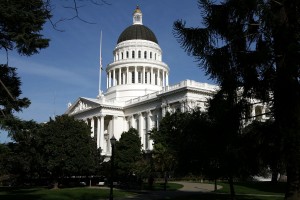Here are five potholes that the participants warned about on the road ahead …
1. The state is plagued by economic inequality.
“California is strong, but it’s unequally strong,” said Carol Whitehead, a former mayor of Modesto, who served in the administration of Gov. Pete Wilson. Rural places, like the San Joaquin Valley and Imperial County, are getting left behind, she said.
The same is true in Los Angeles, where unemployment is still very high, added civil rights attorney Maria Blanco.
“The inequities in California are very troubling to me,” she said. “We have a very unprepared workforce. … In L.A. you get the sense that there’s a very large segment of the population that will always be barely making ends meet, and that their kids will be in the same situation. That has a lot to do with the education system and with where are the good jobs.”
2. California’s political system remains a tangled mess.
Though he believes California is strong, veteran journalist Joe Mathews, who is the California editor at Zocalo Public Square, described his “profoundly pessimistic” view of our governing system. “It’s irretrievably broken, it has not been fixed by any of the reforms and it may be in worse shape as a result of our attempts to fix it.”
3. Californians rely on infrastructure but they don’t understand what it costs to keep it working.
In wealthy Silicon Valley, for example, residents expect clean, drinkable water as “a God-given right,” said Campbell Mayor Evan Low.
“When they turn on the lights, the lights come on, and when you flush your toilet it just magically disappears, and when you take out your garbage someone magically takes it away,” he went on. “But we know at the local level this costs a tremendous amount of money. Investment in infrastructure is not a sexy issue, but the fundamentals of our infrastructure are critically important.”
4. The voter-approved tax increase, Proposition 30, was a drop in the bucket in meeting the state’s educational needs.
Not only will that temporary tax expire a few years from now, but there’s a huge problem of deferred maintenance in the state, said Louis Freedberg, director of EdSource.
“Look at the three systems of higher education,” said Freedberg, a former longtime writer at the San Francisco Chronicle. “They need like a billion dollars in each one of these systems, because for the last several years these systems have gotten no money for repairing roofs and plumbing. This hasn’t been solved with Prop. 30.”
5. California’s economy and politics are still prone to roller-coaster-like volatility.
“As long as our tax system is as progressive and unstable as it is, everything we try to fix today is going to be ripped out three years from now,” said Susan Kennedy, who served as deputy chief of staff to Gov. Gray Davis and chief of staff to Gov. Arnold Schwarzenegger. “Fifty percent of our revenue in the state comes from capital gains and personal income tax: a bad day on the NASDAQ and you have to cut education funding. … You need to go to more stable revenue streams.”
But the folks around the table also saw at least four beacons of hope.
1. People trust their local governments, even if they’re still skeptical about state government.
Californians know their local leaders so they feel a connection to them, said Ben Duran, former president of the Merced Community College District.
“People love their local school districts, even though they may be dysfunctional, but they live in them, they belong to them,” he said. “School board members are lay people …. When you look at good schools, they come down to good people in those schools,” and the job of the citizens who sit on the school board is simply “to hire some really good people.”
2. Sacramento is actually starting to function a little better.
“Finally we’re getting a little shake-up with the open primary, you add redistricting, and then you add extension of term limits to 12 years. I think we can get something here,” said former Lt. Gov. Abel Maldonado. “You start to see some members that are now, ‘OK, I’m here for 12 years, I’m going to have coffee with my neighbor. I don’t care if he’s a Democrat. We’re going to get the job done.’ ”
3. The supermajority that Democrats won last November creates an opportunity to be effective.
“Voters are happier when people in Sacramento are not fighting,” said Ellen Hanak, a senior fellow at the Public Policy Institute of California. “That’s probably why the public is feeling better about the Legislature right now. We’ve passed two budgets on time. That’s a direct outcome of small but significant reform. People just want things to be happening and to get it done. A lot of things that are going to be important have to go back to voters for constitutional reform, and now the Legislature can more easily send things.”
4. A new generation has more faith in government and is engaging in the political process.
As a member of the Independent Citizens Redistricting Commission that drew the state’s new political boundaries, Maria Blanco was impressed by the desire of citizens to be involved.
“The level of participation was amazing,” she said. “Up and down the state we had overflow crowds. There was a real desire to want to trust in government…. Their biggest hope was that, if the districts were representative, that more people would then vote.”
They talked about a lot more, too.
